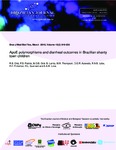Por favor, use este identificador para citar o enlazar este ítem:
http://www.alice.cnptia.embrapa.br/alice/handle/doc/857019| Título: | ApoE polymorphisms and diarrheal outcomes in Brazilian shanty town children. |
| Autor: | ORIÁ, R. B.  PATRICK, P. D.   ORIÁ, M. O. B.   LORNTZ, B.   THOMPSON, M. R.   AZEVEDO, O. G. R.   LOBO, R. N. B.   PINKERTON, R. F.   GUERRANT, R. L.   LIMA, A. A. M.   |
| Afiliación: | Departamento de Morfologia e Instituto de Biomedicina do Semi-árido Brasileiro (IBISAB), Faculdade de Medicina, Universidade Federal do Ceará, Fortaleza, CE Kluge Children’s Rehabilitation and Research Center, University of Virginia, Charlottesville, VA, USA Departamento de Enfermagem, Universidade Federal do Ceará, Fortaleza, CE Instituto de Biomedicina do Semi-árido Brasileiro (IBISAB), Faculdade de Medicina, Universidade Federal do Ceará, Fortaleza, CE Center for Global Health, School of Medicine Instituto de Biomedicina do Semi-árido Brasileiro (IBISAB), Faculdade de Medicina, Universidade Federal do Ceará, Fortaleza, CE RAIMUNDO NONATO BRAGA LOBO, CNPC Center for Global Health, School of Medicine Center for Global Health, School of Medicine e Instituto de Biomedicina do Semi-árido Brasileiro (IBISAB), Faculdade de Medicina, Universidade Federal do Ceará, Fortaleza, CE Center for Global Health, School of Medicine e Instituto de Biomedicina do Semi-árido Brasileiro (IBISAB), Faculdade de Medicina, Universidade Federal do Ceará, Fortaleza, CE. |
| Año: | 2010 |
| Referencia: | Brazilian Journal of Medical and Biological Research, v. 43, n. 3, p. 249-256, Mar. 2010. |
| Descripción: | A series of studies have shown that the heavy burdens of diarrheal diseases in the first 2 formative years of life in children living in urban shanty towns have negative effects on physical and cognitive development lasting into later childhood. We have shown that APOE4 is relatively common in shanty town children living in Brazil (13.4%) and suggest that APOE4 has a protective role in cognitive development as well as weight-for-height in children with heavy burdens of diarrhea in early childhood (64/123; 52%), despite being a marker for cognitive decline with Alzheimer?s and cardiovascular diseases later in life. APOE2 frequency was higher among children with heaviest diarrhea burdens during the first 2 years of life, as detected by PCR using the restriction fragment length polymorphism method, raising the possibility that ApoE-cholesterol balance might be critical for growth and cognitive development under the stress of heavy diarrhea burdens and when an enriched fat diet is insufficient. These findings provide a potential explanation for the survival advantage in evolution of genes, which might raise cholesterol levels during heavy stress of diarrhea burdens and malnutrition early in life. |
| NAL Thesaurus: | Apolipoprotein E Malnutrition Diarrhea Children |
| Tipo de Material: | Artigo de periódico |
| Acceso: | openAccess |
| Aparece en las colecciones: | Artigo em periódico indexado (CNPC)  |
Ficheros en este ítem:
| Fichero | Descripción | Tamaño | Formato | |
|---|---|---|---|---|
| APIApoEpolymorphismsanddiarrhealoutcomesinBrazilianshantytownchildren.pdf | 474,03 kB | Adobe PDF |  Visualizar/Abrir |









